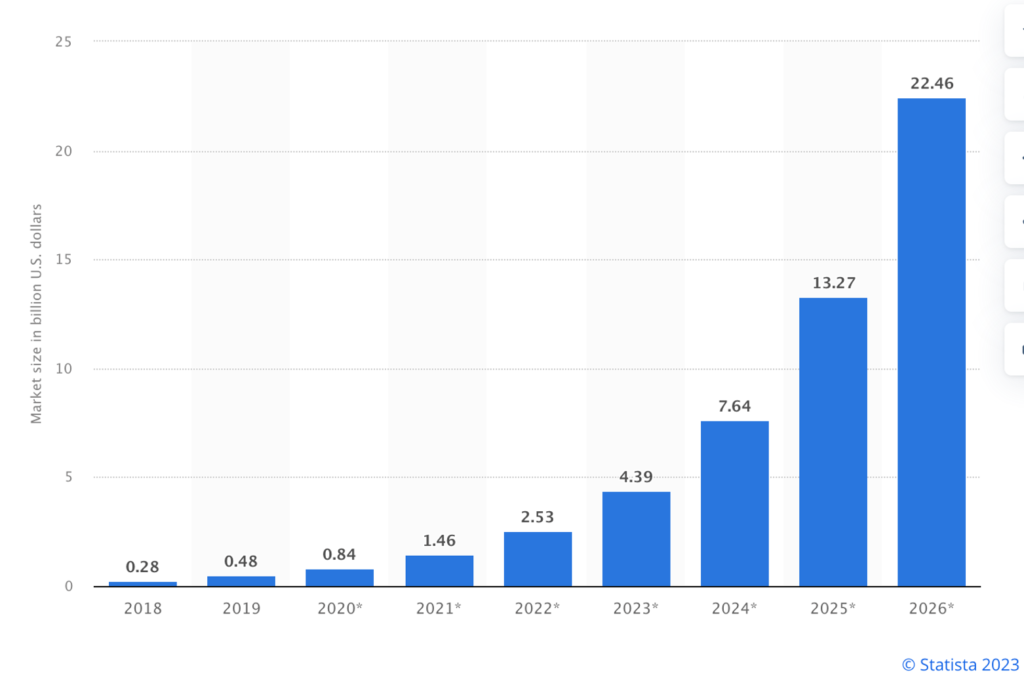We have all heard about blockchain in conjunction with the cryptocurrency landscape, which heavily relies on blockchain mechanisms to keep track of financial transactions. Moreover, we cannot oversee the history of crypto crashes that dramatically dropped its value. Yet, that doesn’t mean that blockchain technology, with its concepts and applications, is worthless, but a question still lingers – What is the future of blockchain?
We can all agree that blockchain’s future lies between communication network technologies and the security of subsequent network-based applications. Also, this immersive technology could grow the global economy by US$1.76 trillion by 2030 by raising tracking, tracing, and trust levels, a PwC report advises us.
As blockchain technology is already building secure digital environments to underpin Web3 and the Metaverse, today we will debate blockchain and its future implications. So read further, stay caught up, and discover if blockchain is the future beyond 2023.
The Future Blockchain’s Role in Digital Transformation
We all know by now that blockchain can significantly and disruptively impact many business models due to its core key elements, such as encryption, immutability, tokenization, decentralization, and distribution.
Just imagine that a simple business transaction can be done in just a matter of minutes, between 2 sole parties, without needing to use intermediaries, as seen up until now for any transaction.
As blockchain has the potential to identify business participants, ensure the security of transactions, validate them, offer faster transaction times, and execute the ecosystem rules, the future of blockchain lies at the intersection of three domains – technology, finance, and governance in any industry, where innovative solutions and transformative applications will emerge.
Blockchain’s Impact on Diverse Industries
Blockchain keeps evolving and integrating cutting-edge technologies, shaping new business models, redefining the traditional financial system, and paving the way for a new form of governance. The journey ahead will undoubtedly present challenges, but the potential rewards for those who navigate this intersection skillfully are immense.
1. Blockchain Could Turn Banking on Its Head
To sum up, the state of banking alongside blockchain tech is expected to grow exponentially to approximately 22.5 billion U.S. dollars in 2026. Moreover, blockchain tech can potentially decrease instances of human error and fraud.

2. Corporate Governance, DAOs, and Blockchain Technology
If traditional corporate governance is based on centralized concepts, blockchain can disrupt this conventional approach by increasing transparency and using smart contracts. The central aspect of corporate governance is that it is susceptible to human errors, self-interests, and many others that erupt from having authority over others.
Given this, DAOs could be a new business model based on modern technologies like blockchain that can bring innovative solutions to this classical problem.
3. Blockchain Rocking the Human Resources Landscape
Blockchain already has the advantage of a distributed database that allows for secure, transparent, and tamper-proof transactions, which could revolutionize the HR landscape.
From managing employees’ data and providing them with more control to enhancing compliance with regulations, reducing costs associated with recruiting and hiring, and increasing overall transparency, blockchain could simply address these using smart contracts.
However, before delving into investments related to blockchain stocks, cryptocurrencies, and other blockchain-driven ventures, it is crucial to thoroughly explore and comprehend the emerging trends, potential challenges, and intricate ethical considerations that accompany this transformative landscape.
A comprehensive understanding of these factors will empower you to make informed and strategic decisions in the dynamic world of blockchain investments.
Blockchain Marvels: Emerging Trends and Innovations
As blockchain technology gains traction and global recognition due to cryptocurrencies, many organizations are exploring ways to harness its potential for various applications. It’s no wonder that blockchain could add value through a vast database tool that could beneficially impact the global economy by $1.76 trillion by 2030.
Then, is blockchain the future? The simple answer is yes.
Blockchain tech could have many implications and benefit society and the economy, as many businesses are getting closer and closer to the Web3 and Metaverse environment, thanks to its security and privacy-enhancing abilities.
Moreover, in years to come, blockchain will emerge in the following:
- Supply Chain by providing instant access to the status or authenticity of a product;
- International Trading by using smart contracts, thus reducing the overall costs, and eliminating intermediaries;
- DeFi (Decentralized Finance) uses smart contracts instead of paying a specific charge or fee for using the bank’s services;
- Cryptocurrencies and payment systems benefit from storing transactional data in peer-to-peer networks, eliminating the involvement of centralized authorities. However, it also enhances security by creating a greater demand for high-performance systems with faster transaction times.
On the other hand, understanding the crypto market and its role in shaping the blockchain landscape highlights the interconnectedness between digital assets’ valuation and the broader evolution of decentralized technologies.
The Road to Blockchain Adoption
Undoubtedly, blockchain technology is a decentralized and distributed digital ledger that’s slowly and surely changing the digital economy. As it could impact the various sectors, it also opposes a new set of regulatory challenges. Thus, it is crucial for businesses, enterprises, and individuals looking to leverage this technology.
On the other hand, in the past year, we have witnessed many of SEC’s implications within the crypto domain, which could also extend to the blockchain sector. One thing we must know, it the blockchain regulatory landscape could be complex, reflecting the technology’s diverse applications.
For example, the Securities and Exchange Commission (SEC) oversees blockchain-based tokens and Initial Coin Offerings (ICOs) in the United States. At the same time, the Commodity Futures Trading Commission (CFTC) regulates cryptocurrencies as commodities.
Also, the European Commission launched a regulatory sandbox for innovative use cases involving Distributed Ledger Technologies (DLT) in February to enhance legal clarity for innovative blockchain solutions.
As these regulations give us hope for future adoption, blockchain technology has a bigger purpose of raising the bar for many industries.
Future of Blockchain: Social and Ethical Considerations
By now, we’ve learned that blockchain is the future, potentially revolutionizing how we interact by offering a decentralized and transparent platform or application.
Many industry experts and analysts are projecting a CAGR (Compound Annual Growth Rate) of 87.1% from 2022 to 2030, reaching a staggering market size of USD 1,593.8 billion. If blockchain weren’t the future, it wouldn’t be so praised and raised, right? Thus, the exponential growth reflects the vast potential of this innovative technology to revolutionize industries and transform global economies.
Nevertheless, blockchain’s disruptive essence also raises several ethical and social implications that require responsible and sustainable use. To mention a few, we have:
- Privacy and data security in financial transactions;
- Cybersecurity and hacking – as blockchain could be used for disreputable purposes;
- Fairness and accessibility – as the technical equipment comes at a higher cost;
- The impact on traditional institutions and industries – as blockchain enables transparency and accountability;
- Decentralization and democratization of power – because it enables users to engage in direct, peer-to-peer transactions without intermediaries.
These are just a few changes that the future of blockchain technology will bring to the surface in the years to come. However, it is essential to comprehend that all these aspects need to be treated from a cautious perspective, as the evolution of blockchain technology promises to be fascinating and could shape the future of industries and institutions.
Is Blockchain the Future? Final Thoughts
Since we have reached the end of this comprehensive journey within the realm of blockchain’s potential and stand on the cusp of a new era, we hope we have answered one of the most asked questions – What’s the future of blockchain?
One thing is for sure: among the many emerging technologies of tomorrow, blockchain stands out as a promising force, carrying the power to bring significant changes.




